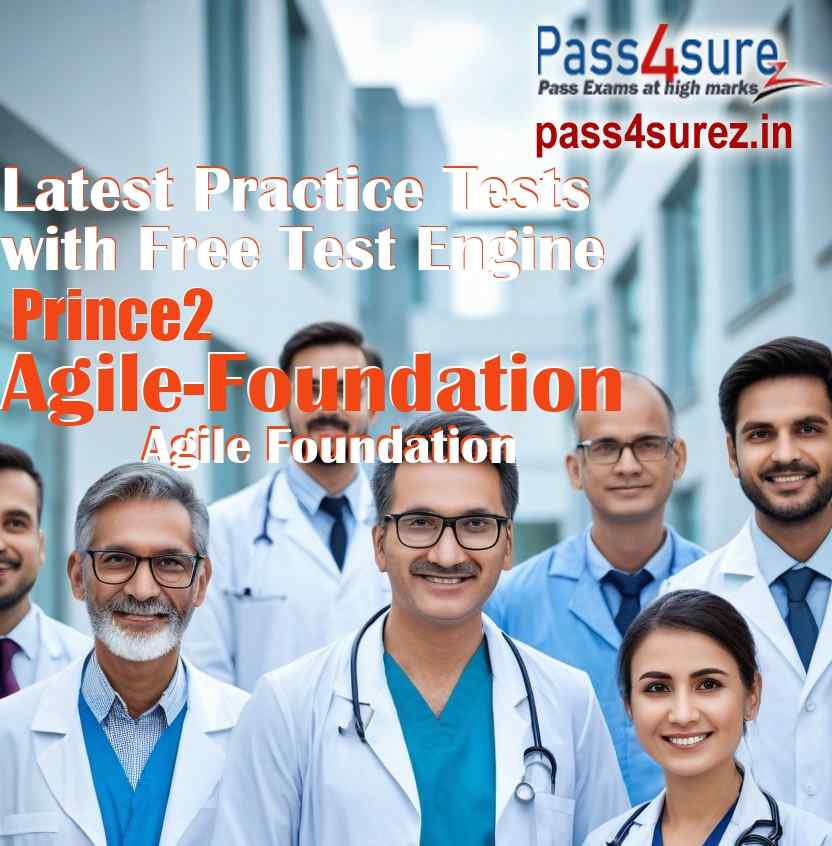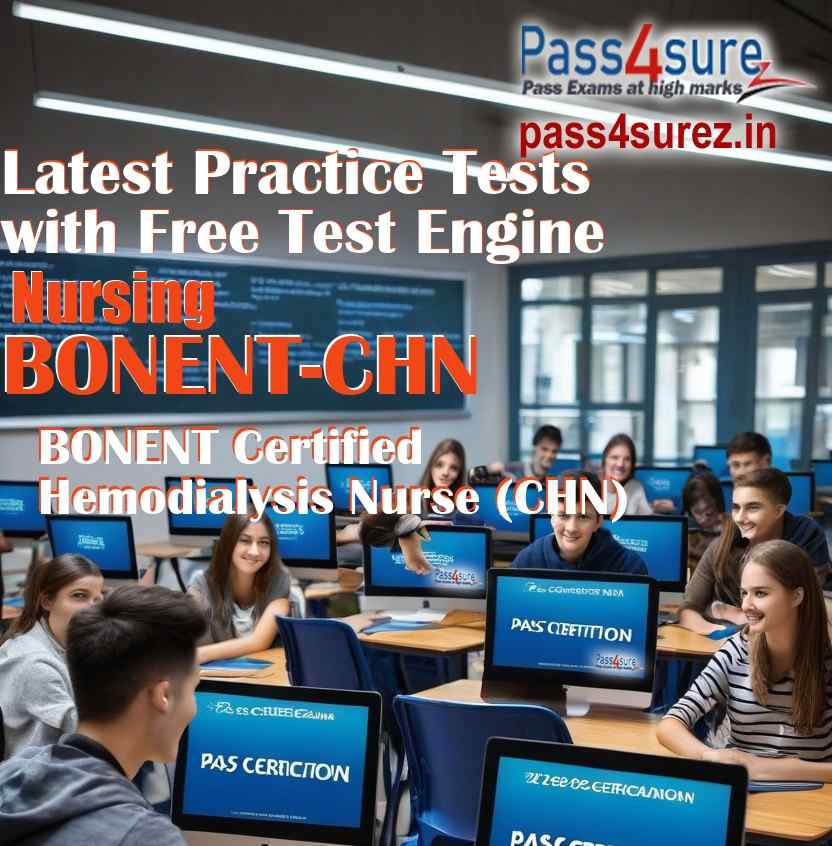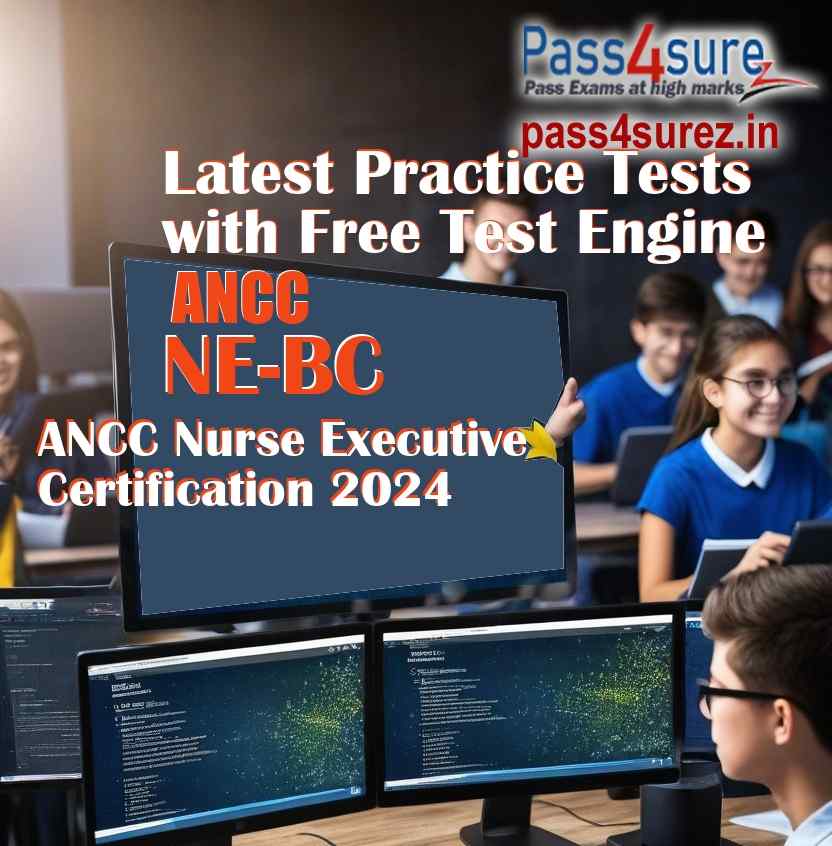| Exam Code | NE-BC |
| Questions and Answers | 501 |
| Premium Access | Yes |
| Online Test Engine | Yes |
| Comprehensive Q&A | Yes |
| Success Rate | 98% |
| Real Questions | Yes |
| Updated Regularly | Yes |
| Portable Files | ✔ |
| Unlimited Download | ✔ |
| 100% Secured | ✔ |
| Confidentiality | 100% |
| Success Guarantee | 100% |
| Any Hidden Cost | $0.00 |
| Auto Recharge | No |
| Updates Intimation | by Email |
| Technical Support | Free |
| PDF Compatibility | Windows, Android, iOS, Linux |
| Test Engine Compatibility | Mac/Windows/Android/iOS/Linux |
| Sample Questions |  |
Pass4sure Practice Tests are an effective way to prepare for the NE-BC exam. The practice tests include premium PDF and Test Engine Software. Pass4surez.in provides an extensive question bank to improve your knowledge and help you achieve high marks on the NE-BC exam.
The ANCC Nurse Executive Certification 2024 exam questions and answers on Pass4surez.in are regularly verified and updated to ensure they reflect the latest syllabus and topics covered in the real test. The certification exams and entry test exams from pass4surez.com make you familiar with the test environment. The goal is to enhance your knowledge of the NE-BC exam and enable you to pass it on your first attempt.
The PDF of NE-BC exam questions and answers provided by Pass4surez.in contains a comprehensive pool of questions and verified answers, including references and explanations where applicable. The objective is not only to help you pass the exam, but also to significantly improve your knowledge of the latest NE-BC course topics.
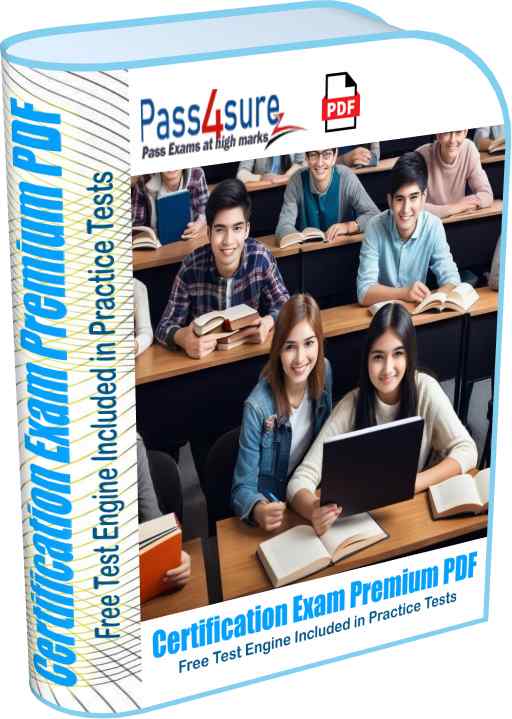 |
|
CERTIFICATION EXAM PREMIUM PDF
Pass4Sure provide premium PDF that contains all the questions and answers that are necessary to make your concepts about the exam topics clear and boost your knowledge about the exam. These questions and answers make you ready to face actual test in test centers. Our team keep on revising material and update the exam questions accordingly. You will feel confident in test center. Our support team keep on helping our customers to make their testing experience best. Our premium PDF files are searchable, convertable and printable at high quality to make book that you can study during traveling or during vacations. Our automated system sends intimation email to our customers on each update. The files in customer download section is overwritten with latest pdf files.
|
| |
|
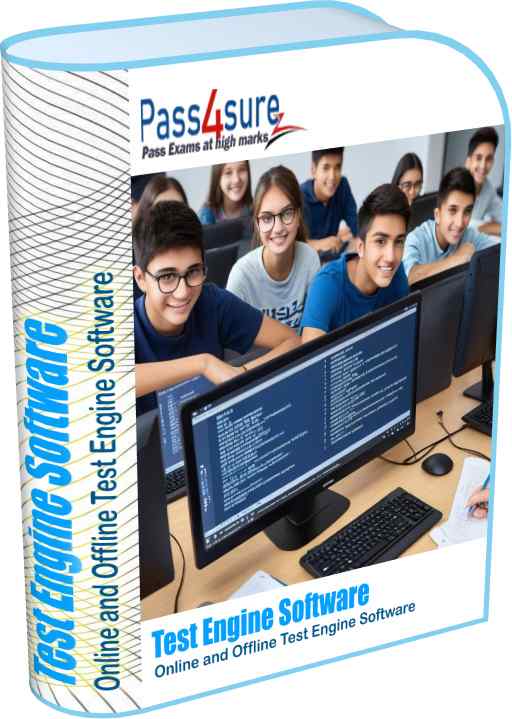 |
|
CERTIFICATION EXAM TEST ENGINE
Pass4sure test engine is best certification and examination preparation tool that help you make yourself ready to take the actual exam and get high marks in the exam. Our OTE (Online Test Engine) support all OS Platforms including iOS, Android, Windows, Linux, Chromebook etc and provide up to date experience to get ready for actual test. Our Offline Test Engine is compatible to all windows platforms including latest windows versions. Our test engines helps to familiarize actual test environment and makes you ready to take timed tests. Your performance history and graphs helps you to see when you are ready to sit in actual exam in test center. These test engines uses up to date and latest questions and answers, keeps on updating the questions pool and sends you intimation on each update.
|
Pass4sure Premium PDF and Test Engines support all platforms and devices including mobile devices and computers. You should download sample PDF and Test Engine to evaluate the product before you buy the full version. Our exam samples include some questions that may be or may not be up to date but full version is always up to date.
Exam : NE-BC
Exam Name : ANCC Nurse Executive Certification
Number of Questions : 175
Scored Questions : 150
Unscored Questions : 25
Category Domains of Practice No. of Questions Percent
I Structures and Processes 27 18%
II Professional Practice 55 37%
III Leadership 33 22%
IV Knowledge Management 35 23%
Total 150 100%
There are 175 questions on this examination. Of these, 150 are scored questions and 25 are pretest questions that are not scored. Pretest questions are used to determine how well these questions will perform before they are used on the scored portion of the examination. The pretest questions cannot be distinguished from those that will be scored, so it is important for a candidate to answer all questions. A candidate's score, however, is based solely on the 150 scored questions. Performance on pretest questions does not affect a candidate's score.
I. Structures and Processes (18%)
A. Human Capital Management
Knowledge of:
1. Federal and state laws (e.g., Family and Medical Leave Act [FMLA], American with Disabilities Act [ADA], Fair Labor Standards Act [FLSA], wage and hour laws, equal employment opportunities, Occupational Safety and Health Administration [OSHA],
workers compensation)
2. Labor relations (e.g., collective bargaining, contract negotiations, grievances and arbitrations, National Labor Relations Board [NLRB])
3. Resource utilization (e.g., cross training, job descriptions )
4. Principles associated with human resources (e.g., employee assistance and counseling, compensation, benefits, coaching, performance management)
5. Organizational culture (e.g., just culture, transparency)
6. Organizational structure (e.g., chain of command, organizational chart, span of control)
Skills in:
7. Participating in developing and modifying administrative policies and procedures
8. Implementing and enforcing administrative policies and procedures (e.g., monitoring compliance)
9. Providing feedback on effectiveness of administrative policies and procedures
10. Evaluating the effectiveness of roles based on changing needs in the health care environment (e.g., new or expanded job descriptions, professional development)
B. Financial Management
Knowledge of:
1. Basic financial and budgeting principles (e.g., revenue cycle, supply and labor expenses, productivity, depreciation, return on investment [ROI], cost-benefit analysis)
2. Reimbursement methods (e.g., payor systems, pay for performance, payment bundling, value-based purchasing)
3. Contractual agreements (e.g., vendors, materials, staffing)
4. Principles of staffing workload (e.g., full-time equivalents [FTE], hours per patient day, skill mix)
Skills in:
5. Developing a budget (e.g., operational, capital)
6. Analyzing variances and managing a budget (e.g., operational, capital)
7. Efficient resource utilization (e.g., contractual agreements, outsourcing)
8. Determining appropriate staffing workload
C. Health and Public Policy
Knowledge of:
1. Legal issues (e.g., fraud, whistle-blowing, the Health Insurance Portability and Accountability Act [HIPAA], corporate compliance, electronic access and security, harassment, malpractice, negligence)
2. Consumer-driven health care (e.g., public reporting, Community Health Needs Assessment [CHNA], Hospital Consumer Assessment of Healthcare Providers and Systems [HCAHPS], Healthgrades)
3. Emergency planning and response
4. Planning and responding to internal and external disasters
5. Planning and responding to health and public policy issues
6. Assessing, addressing, and preventing legal issues (e.g., violations, fraud, whistleblowing, the Health Insurance Portability and Accountability Act [HIPAA], corporate compliance, electronic access and security, harassment)
II. Professional Practice (37%)
A. Care Management/Delivery
Knowledge of:
1. Health care delivery models and settings (e.g., accountable care organization [ACO], patient-centered medical home [PCMH], nurse-led clinic, telehealth, e-health, inpatient, ambulatory care, home health, rehabilitation, etc.)
2. Laws, regulations, and accrediting bodies (e.g., The Joint Commission, Centers for Medicare and Medicaid Services, Nurse Practice Act)
3. Standards of nursing practice (e.g., clinical practice guidelines, clinical pathways, ANA Scope and Standards of Practice, Nurse Practice Act)
Skills in:
4. Establishing staffing models (e.g., primary care nursing, team nursing, nurse-patient ratios, skill mix, acuity)
5. Designing workflows based on care delivery model and population served (e.g., patient centered medical home [PCMH], interdisciplinary team, case management, disease management, throughput, staffing assignment and scheduling)
6. Developing policies and procedures that ensure regulatory compliance with professional standards and organizational integrity
B. Professional Practice Environment and Models
Knowledge of:
1. Professional practice models
2. Role delineation (e.g., credentialing, privileging, certification)
3. Professional practice standards (e.g., ANA Scope and Standards of Practice, Nurses Bill of Rights, Nurse Practice Act)
4. Employee performance feedback (e.g., coaching, performance appraisal, Just Culture)
Skills in:
5. Developing clinical staff (e.g., orientation, continuing education, competency validation, performance appraisal, peer review, mentoring, planning, lifelong learning)
6. Creating a professional environment for empowered decision making (e.g., shared governance, staff accountability, critical thinking, civility)
7. Recruiting, recognizing, and retaining staff
8. Providing internal and external customer service (including service recovery)
9. Creating a vision for professional nursing practice that promotes patient and family centered care
C. Communication
Knowledge of:
1. Communication principles (e.g., active listening, reflective communication, two-way communication, interviewing)
2. Communication styles (e.g., persuasive, assertive, passive, aggressive, passiveaggressive)
3. Negotiation concepts and strategies (e.g., compromising, collaborating, win-win)
4. Communication processes that support safe patient care (e.g., documentation, handoffs or hand-overs, bedside reporting, incident reporting, reporting sentinel events)
Skills in:
5. Communicating using verbal (e.g., oral and written) and nonverbal methods (e.g., body language, eye contact, active listening)
6. Facilitating collaboration to achieve optimal outcomes (e.g., team building, group dynamics, leveraging diversity)
7. Selecting the appropriate communication method for the audience and situation (e.g., email, role playing, presentation, reports, staff meeting, board meeting, one-on-one conversation, patient/family council, consumer feedback)
8. Conflict management
III. Leadership (22%)
A. Leadership Effectiveness
Knowledge of:
1. Key elements of a healthy work environment
2. Leadership concepts, principles, and styles (e.g., pervasive leadership, servant leadership, situational leadership, appreciative inquiry, culture of transparency, change management theories)
3. Coaching, mentoring, and precepting
4. Emotional intelligence
5. Sources of influence and power
Skills in:
6. Self reflection and personal leadership evaluation
7. Integrating diversity and sensitivity into the work environment
8. Change management
9. Building effective relationships through listening, reflecting, presence, communication, and networking
10. Succession planning
11. Creating an environment to engage and empower employees
B. Strategic Visioning and Planning
Knowledge of:
1. Strategic planning principles (e.g., alignment of nursings strategic plan with the organizational plan, SWOT analysis, components of strategic planning)
2. New program development (e.g., proposals, pro forma, business plans, marketing)
3. Trends that effect nursing practice and the healthcare environment
4. Communicating and building consensus and support for the strategic plan
5. Establishing baselines for processes (i.e., measuring current performance)
6. Evaluating processes and outcome measures over time
7. Project management to support/achieve the strategic plan (e.g., planning, implementing, and monitoring action plans)
C. Ethics and Advocacy
Knowledge of:
1. Ethical principles
2. Business ethics (e.g., corporate compliance, privacy)
3. ANAs Code of Ethics
4. Patients Bill of Rights
Skills in:
5. Advocating for patients (e.g., patient rights, access, and safety)
6. Advocating for staff (e.g., healthy work environment, equipment, staffing)
7. Advocating for the nursing profession (e.g., professional organizations, promoting education, certification, legislative influence)
IV. Knowledge Management (23%)
A. Quality Monitoring and Improvement
Knowledge of:
1. Systems theory
2. Continuous performance improvement (The Plan-Do-Study-Act [PDSA] Cycle, Lean, root cause analysis, tracer methodology)
3. Process and outcome measures (e.g., clinical, financial, safety, patient satisfaction, employee satisfaction)
4. Culture of safety (e.g., risk management, employee engagement, employee safety technologies [patient lifts], patient safety technologies [bar coding])
Skills in:
5. Creating a culture of continuous performance improvement
6. Translating data into information (including use of internal and external benchmarks), and disseminating it at various levels within the organization
7. Evaluating and prioritizing outcomes of care delivery (e.g., nurse sensitive indicators, ORYX indicators, National Patient Safety Goals, core measures)
8. Selecting the appropriate continuous performance improvement technique
9. Action planning to address identified quality issues
B. Evidence-based Practice and Research
Knowledge of:
1. Institutional Review Board (IRB) requirements (e.g., protection of human research subjects)
2. Research and evidence-based practice techniques (e.g., literature review, developing research questions, study methods and design, data management, levels of evidence)
3. Distinguish between performance improvement, evidence-based practice, and research
4. Creating a culture and advocating for resources that support research and scholarly inquiry (e.g., journal club, grant writing, research councils, research participation)
5. Communicating research and evidence-based findings to internal and external stakeholders
6. Incorporating evidence into policies, standards, procedures and guidelines
7. Evaluating and incorporating new knowledge and published research findings into practice
C. Innovation
Knowledge of:
1. Clinical practice innovation
2. Leadership practice innovation
Skills in:
3. Creating a culture that values, encourages, and recognizes new and innovative ideas that benefit the patient, family, organization, or community
4. Developing a framework for implementing innovations (e.g., small tests of change, pilot studies)
5. Leveraging diversity to encourage new and innovative ideas or new patterns of thinking
6. Evaluating and applying technology to support innovation
You can download a free PDF of the NE-BC practice test and study guide to try before purchasing the premium files. To ace the exam, simply download the NE-BC exam questions and answers file, memorize the content, and practice with the VCE Exam Simulator. This will ensure you are fully prepared for the real test.
The NE-BC PDF practice test and exam questions and answers can be accessed on any device, including iPhone, iPad, Android, and Windows. You can download the PDF to your computer or any other device and start studying. Additionally, you can download and install the VCE Exam Simulator for further practice. The NE-BC PDF is printable in high quality, allowing you to take it with you on vacations or while traveling. Your updated NE-BC exam files can be accessed anytime from your online account, and you will receive your login credentials immediately after purchase.
